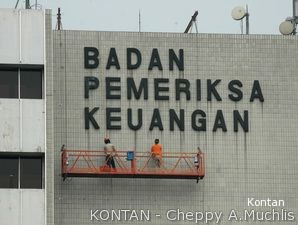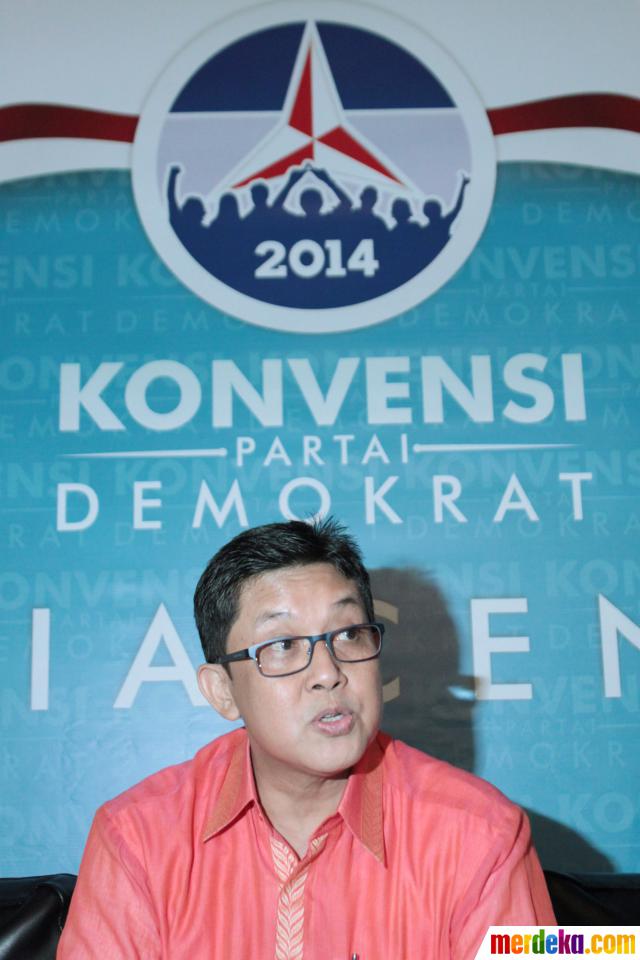Perceptions of political influence on the Indonesian Supreme Audit Agency’s governing board continue to challenge its need for independence
Anna Peterson
For many observers of Indonesian politics, the legislative and presidential elections taking place this year will be the most important barometer of Indonesia’s democratic reform. But the quality of bureaucratic institutions can also tell us much about Indonesia’s young democracy. The Supreme Audit Agency (Badan Pemeriksaan Keuangan, or BPK) has been a focus of Indonesia’s democratic and bureaucratic reform over the past 15 years, and has made strong progress toward becoming an impartial monitoring agency. However, the BPK still faces challenges when it comes to ensuring accountability of the public sector and the spending of public resources.
The BPK’s job includes monitoring irregularities in the budgetary reporting of government bodies and uncovering financial dealings between state actors and private interests of the nature described in many contributions to this Special Edition. But domestic and international observers continue to question the independence of the BPK’s governing board. In October 2014, the Indonesian parliament is due to reappoint five positions on the BPK’s nine-member governing board. The refreshed composition of the board will provide observers with valuable insight into the success, or otherwise, of reforms intended to enhance the BPK’s independence.
An unlikely place for party politics
The sedate world of an audit office would seem a somewhat unlikely place for party politics. The BPK’s role is to monitor government spending, hold the government to account and maintain public and parliamentary confidence in its reports. Thus it relies on being independent from bureaucratic, executive and political influence. However, the BPK has an enduring connection with political parties, largely through its governing board. While there have been a series of important reforms aimed at increasing the agency’s independence, there remains scope for further improvement.
During Suharto’s New Order the BPK’s independence was, unsurprisingly, minimal. For thirty years the central government approved the BPK’s audit reports, members of its governing board were appointed and dismissed by President Suharto, and it had no freedom from executive influence. Without any independence, the BPK was unable to fulfill its role, and the abuse of public office and public resources could occur at the whim of the president.
After Suharto’s resignation in 1998, and in step with Indonesia’s broader democratic reforms, the apron strings tying the BPK to executive government gradually began to loosen. But there remained a tendency for members of the BPK’s governing board to possess links to political parties. In 2001, the World Bank’s report, ‘Indonesia: Country Financial Accountability Assessment’, highlighted the tendency of BPK board members to have links with political parties. The report observed that several members were former parliamentarians, appointed by President BJ Habibie in October 1998. In some cases, the new board members only resigned their parliamentary positions once appointed to the BPK. The report argued ‘such appointments may seriously undermine the independence of BPK and have the potential to give rise to conflicts of interest’. In addition, ‘the perception of independence can become clouded when the board of BPK is mainly composed of officers who have been closely associated with political parties’.
The tendency for members of the BPK’s board to possess links to political parties does not sit comfortably with international standards set down in the International Organisation of Supreme Audit Institutions’ (INTOSAI) Code of Ethics: ‘it is important to maintain both the actual and perceived political neutrality of the [Supreme Audit Institution]. Therefore it is important that auditors maintain their independence from political influence in order to discharge their audit responsibilities in an impartial way’.
The slow process of reform
It is not surprising that members of the BPK’s board, as selected in 1998, possessed political affiliations. Indeed, at that point in time the board selection process was still under the auspices of the president. In recognition of concerns about the agency’s independence, the BPK and the Indonesian parliament introduced a range of reforms between 2001 and 2007 that were intended to provide the agency with the independence it required.
The first of those reforms came in 2001 with the third amendment of the 1945 Constitution which, among other things, established that the president could no longer appoint the BPK’s Chairman. Several years later, the Law of Audit (2004) and the Law on BPK (2006) introduced additional changes that included legislating the processes for the appointment, tenure and reappointment of BPK board members, specifically the president no longer selects the members, and increasing the number of BPK Board members from seven to nine. In 2007, the BPK introduced a Code of Ethics to guide the integrity and professionalism of BPK board members and auditors.
Enduring perceptions of political influence
These reforms are tempered by critiques of the audit model employed by the BPK. The ‘board’ or ‘collegiate’ model is considered to be the model at greatest risk of political influence. In this model the parliament appoints members of a governing board for a fixed term. As Transparency International has observed in relation to the collegiate model generally, ‘in this system, the method of appointing board/college members might be problematic, particularly if a political party has a dominant position in parliament and can thus exercise influence over who is appointed – which may undermine the independence and impartiality of the institution’. Furthermore, if the appointment of members coincides with the country’s election cycle ‘it may increase even further the risks of political influence’. Indeed, in the case of Indonesia, five positions on the governing board are due for re-appointment this year, which makes the selection of the BPK’s board partially aligned with the election cycle.
A perception of political influence can undermine public confidence in the agency. For example, when new appointments to the board are due the press regularly reports on political affiliations that may affect the BPK’s independence. In the lead-up to a renewal of the board in 2009 The Jakarta Post stated, ‘with the BPK’s leadership composed mostly of politicians and staunch supporters of the ruling elite, there is growing concern over the agency’s independence in its job to spot indications of graft at state and government offices’.
Ali Masykur - www.merdeka.com
Concerns aired by the media are not unfounded. Look, for example, at the composition of the board between 2004 and 2009. During that period the board included the late Abdullah Zainie who was a long-standing member of Golkar and member of the House of Representatives from 1971 to 1997 and then again from 1999 to 2004. Baharuddin Aritonang, also on the board, had been a member of the House of Representatives for Golkar between 1999 and 2004. The late Herman Widyananda, another Golkar member who served on the BPK board from 2007 until he passed away in 2011, had been a member of the House of Representatives from 1993 to 1999 and 2003 to 2007. The concern here is not necessarily that board members have had previous political lives but that reforms enacted at the BPK to date have not yet put controls in place regarding the ability of board members to continue to pursue political interests while in office.
Most recently, the absence of such controls was demonstrated by the political activity of a current BPK board member. On 9 June this year, The Jakarta Post noted that BPK board member, Ali Masykur Musa, had stepped down from his position as member of the campaign team for the Prabowo Subianto – Hatta Rajasa presidential ticket following a ‘reprimand from the Elections Monitoring Agency (Bawaslu), which stated that state officials are not allowed to join politics’. The article also observed that Ali Masykur Musa had been a ‘contestant in the Democratic Party presidential convention’. Musa’s involvement with political parties and his subsequent decision to resign from a political role, illustrates the current lack of clarity around the ability of BPK board members to participate in politics while in office.
In the lead-up to the 2014 elections, other general concerns about the interaction of BPK board members and party politics have been aired in the media. In June 2013, The Jakarta Post highlighted that a majority of board members ‘have either strong affiliations to political parties or to vested-interest groups’. The article also stated, ‘critics are alarmed by the integrity and independence of candidates for a top job at the BPK … failure to select a credible person for the job will undermine the professionalism of the agency’. The Indonesian Legal Roundtable’s Erwin Natosmal asserted that ‘the BPK has been turned into a tool for corrupt political parties ahead of the 2014 elections. That is obvious in the current selection process.’
The importance of an independent audit office
As in any democratic country, a robust and independent audit office is fundamental in keeping the government on track and accountable to the Indonesian people. The need for continuing reform was recently pointed out in the Supreme Audit Office of Poland’s Peer Review Report of the BPK, published in April 2014. By way of context, Supreme Audit Institutions (those bodies which provide the highest level of external audit of government agencies in a country) periodically undertake peer reviews of one another. They are generally used as a quality assurance tool to help improve the practices and procedures of the agency under review.
Poland’s Peer Review Report highlighted that reviewers had consistently met with a view from the BPK’s external stakeholders that ‘members of the board should not be involved in current political activities’. The number one recommendation of the report was that a ‘potential board member should be required to resign from membership in any political organisation and withdraw from political activity for the duration of their mandate’. Changes such as these will be important in clarifying expectations around the political engagement of board members. They will also allow for increased public confidence in the BPK and increase assurance that it has the level of independence necessary to fulfil its role of holding the government to account.
International organisations, local media and non-government organisations (NGOs) continue to suggest that perceived or actual political influence on the BPK’s governing board, may affect its independence and therefore limit its ability to perform its essential monitoring and public accountability role. In particular, there are concerns around the ability of BPK board members to participate in politics while in office. Without the BPK’s thorough auditing of government finances and programs, connections between public office and private interests would remain hidden from the public eye. Therefore, the upcoming renewal of five positions on the BPK’s governing board and its resultant configuration will provide scholars of Indonesian politics with important insight into the progress of reforms at the BPK as well as Indonesia’s broader democratic consolidation.
Anna Peterson (u4307118@anu.edu.au) is a Masters student at the College of Asia and the Pacific at the Australian National University. This article represents the personal views of the author only.













